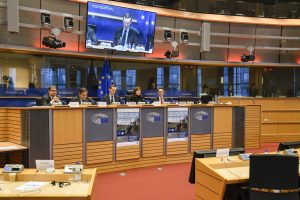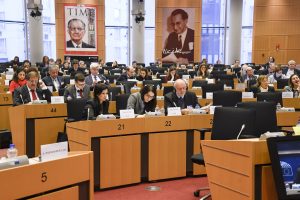Introducing our new course on Policy Writing and Communication for Scientists, Alexandra Athansopoulous-Köpping shares her views on the importance of the topic and its relevance to research.
In the last season of Game of Thrones when the danger of the white walkers was more imminent than ever, esp. in the scene where Sam is at the Citadel (a city-university where all the Maesters are trained) and is frustrated by the inaction of the Maesters and their refusal to become involved with the politics of Westeros on the principle that the Order of the Maesters is to dedicate itself exclusively to the pursue of knowledge. When confronted by Sam they argue that the Citadel has survived all kinds of wars and disasters over hundreds of years. Therefore, there seems to be no reason to become involved in the problems of the outside world as at the end everything will be fine. This really struck me as I sometimes felt the same frustration working at universities.
This culture definitely exists in academia to various degrees depending on the countries and disciplines one finds herself, but it is there. Academic personnel and policy-makers do not speak the same language. When I first started working in the European Parliament it struck me that almost nothing that I learned during my bachelor in political science could be used in my everyday working life. There is a difference between observation of political and actual participation in policy-making processes. And unless one goes to specific public policy schools like Science Po Paris or the Hertie School of Governance in Berlin, it is difficult to get a feeling of what the practice of public policy-making is, what the challenges are attached to it, and how one actually gets involved in policy-making in the first place.
There are many reasons why academics should become more familiar with policy-making process and languages. First, it is very likely that your research will eventually be used in one way or another in the making of public policies. This is true in most disciplines, historians have had to deal with how governments use and legislate around the politics of memory of historical events. Life scientists regularly need to argue their case with public authorities restricting research on e.g. stem cells and heavily regulate their potential usage in medicine. Anthropologists have witnessed how international organization’s policies have impacted the everyday life of people across the developing world. And as much as globalization gives us the impression that states no longer are in charge – that is an illusion. The state with its various levels of power (international, national and local) still regulates a great deal of our everyday life. But engaging with the state and its policy makers is more difficult than just showing up at your local representative’s office hours.
I am convinced that academics can have a positive influence on policy-making. After all, it is them who are going out there and collect a great deal of empirical material about our societies, our economies, our health, our environment, and last but not least the (not so) well-being of our planet. Scientists have seen first-hand how state regulation affects our world positively as well as negatively. Ultimately, it is this research that is used to make arguments for or against certain policies which in turn will have a long-lasting impact.
More and more academic expertise is requested by policy makers in order to understand the issue at hand. For example, the European Parliament regularly organises open or public hearings on different topics to gather as much knowledge as possible on specific topics before legislating on it. It is very likely that researchers are invited to present their view on the topic, but unlike academic conferences where the audience shares the scientific background this will probably not be the case in these settings.
Scientific knowledge should be translated into a language that policy-makers understand implying that researchers need to take a different approach than the one they have learned for scientific writings. Writing policy is normative and problem-solving. It is direct and concise and luckily it is a skill that can be learned as think tanks have spent a considerable amount of time perfecting the method. Like for academic papers, policy papers have developed their own style and structure over the years. There is a variety of research questions that policy papers tackle. This can range from the assessment of a current policy to the proposal of a totally new policy.
Increasingly, PhD students leave academia once they graduate. This means that graduate schools need to invest towards training their students in more than research methods, but also transferable skills so that they are enabled to be employed by the private and public sectors. Communicating and interacting with a non-academic audience has become increasingly crucial for researchers as interaction between policy makers, think tanks and scientists occurs on various levels for example: providing expertise for legislations or, raising awareness on an emerging problem. Furthermore, many research projects are funded by national and international public institutions that often expect some kind of return often in terms of policy proposals and other sorts of public communication of the results.
The pictures show the closing session of a conference that took place in the European Parliament between the Committee of Civil Liberties and the UN Global Compacts on Refugees and Migrants.
Let’s take the European Union as a funding institution for example. Horizon 2020, the current EU’s flagship research program, clearly states that it funds research projects in line with the EU’s specific policy priorities. The European Research Council that was conceived to complement the European Commission’s research programs and promote itself as an “investigator-driven” institution expects that the projects it funds will bring “unpredictable scientific and technological discoveries–the kind that form the basis of new industries, markets and broader social innovation of the future”. Researchers are therefore expected to understand the respective priorities of the EU and to frame their research around those priorities. That requires some skill because to my understanding researcher should still be free in choosing what it is they want to do their research about. Moreover, constantly having to adapt one’s research to what is currently fashionable to do does not exactly promote excellence and innovation. It is therefore up to the researcher to think about how to frame their research to still be relevant for the funding institutions.
At the end of the Game of Throne season, Sam gave up hope to be able to make a change by staying at the Citadel and left it in frustration. Correlating this back to our topic I conclude that being able to effectively communicate on public policies, understand them and explain them means to give the tools to PhDs and researchers to interact with policy-makers and public institutions on more equal terms.
References
European Commission (2018), Horizon 2020 – What is a Work Programme ? ec.europa.eu
Mallett M (2016), Employer perspectives of PhD graduates. blog.jobs.ac.uk
European Parliament Committees (2018), Hearings. europarl.europa.eu
European Research Council (2018). Mission. erc.europa.eu
[all online references were accessed on 28 Mar. 2018]


